Balbharti Maharashtra State Board Class 5 Environmental Studies Solutions Chapter 9 Maps – Our Companions Notes, Textbook Exercise Important Questions and Answers.
5th Standard EVS 1 Lesson Number 9 Question Answer Maps – Our Companions Maharashtra Board
Std 5 EVS 1 Chapter 9 Question Answer
1. Make a list of the various landforms in your surroundings. Draw one of the landforms in your notebook using one of the methods of showing landforms.
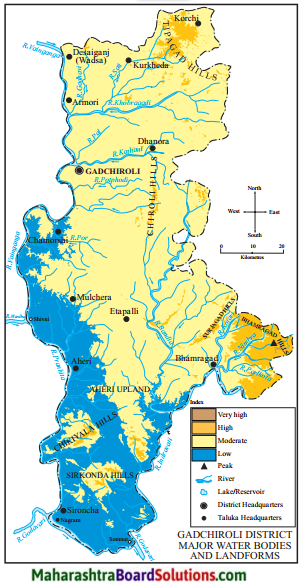
2. In the following sentences, underline the words that represent landform and prepare signs or symbols for them.
Question (a)
Sonali lives just beyond Mount Takmak.
Answer:
Mount (Δ)
![]()
Question (b)
Nilesh has gone on a trip to Gharapuri Island.
Answer:
Island
3. Prepare signs and symbols for the following components:
Question 1.
Prepare signs and symbols for the following components:
House, hospital, factory, park, playground, road, hill, river.
Answer:
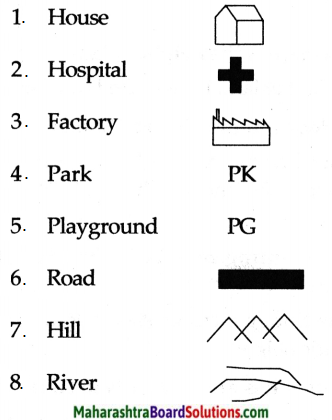
4. The given map shows height through the use of colours. However, one colour representation is wrong. Write which colour would be correct in its place.
Question 1.
The given map shows height through the use of colours. However, one colour representation is wrong. Write which colour would be correct in its place.
Answer:
In place of blue the colour for low elevation to be used should have been green.
![]()
Use your brain power!
Question 1.
will you help them by writing the meanings of each sign and symbol?
Answer:
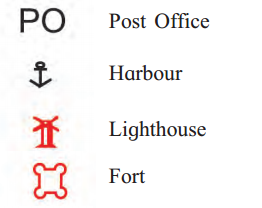
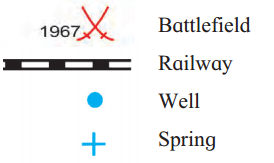
Environmental Studies Part 1 Standard 5th Solutions Chapter 9 Maps – Our Companions Additional Important Questions and Answers
Fill in the blanks with the correct answers from the options given below:
Question 1.
In ancient times, maps were mainly used for ……………… .
(a) weather forecast
(b) wars
(c) tourism
Answer:
(b) wars
Question 2.
The ………………. colour is used to indicate water bodies on a map.
(a) grey
(b) green
(c) blue
Answer:
(c) blue
![]()
Question 3.
The most modem method of indicating height on a map is …………….. method.
(a) contour line
(b) digital elevation
(c) layer tinting
Answer:
(b) digital elevation
Question 4.
The foremost mapmaking institute in India is ………………. .
(a) Survey of India
(b) Mapping of India
(c) Survey of Map
Answer:
(a) Survey of India
Question 5.
The Survey of India headquarters are in
(a) Shimla
(b) Dehradun
(c) Delhi
Answer:
(b) Dehradun
Question 6.
The Survey of India was established in
(a) 1867
(b) 1967
(c) 1767
Answer:
(c) 1767
Question 7.
The land in our environment is not of the same everywhere.
(a) length
(b) height
(c) breadth
Answer:
(b) height
Question 8.
The univemess of land gives rise to various land shapes creating different …………….. .
(a) land forms
(b) strategy
(c) maps
Answer:
(a) land forms
Question 9.
There are different ……………….. of showing land forms on a map.
(a) knowledge
(b) questions
(c) methods
Answer:
(c) methods
![]()
Question 10.
The ………………. and ………………. of land cannot be shown easily on a piece of paper.
(a) depth
(b) width
(c) height
Answer:
(a) depth & (c) height
Question 11.
The height of the land is measured from
(a) ground-level
(b) snow-line
(c) sea-level
Answer:
(c) sea-level
Question 12.
When there is less distance between the contour lines, the slope is ………………… .
(a) steep
(b) gentle
(c) level
Answer:
(a) steep
Question 13.
When the distance between the contour lines is great, the slope is
(a) steep
(b) gentle
(c) level
Answer:
(b) gentle
Question 14.
In layer tinting method, each colour indicates a specific ……………….. .
(a) weight
(b) depth
(c) height
Answer:
(c) height
Question 15.
In digital elevation method, the ………………… is obtained through man-made satellites.
(a) information
(b) technology
(c) height
Answer:
(a) information
Question 16.
Using computers, we can find the height of each point on a ……………………… map.
(a) plain
(b) digital
(c) military
Answer:
(b) digital
![]()
Question 17.
Standard signs and symbols are used to make the ………………….. easy to read.
(a) road
(b) board
(c) map
Answer:
(c) map
Question 18.
……………….. are miniature drawings of the respective objects.
(a) symbols
(b) signs
(c) maps
Answer:
(a) symbols
![]()
2. Match the following:
Question 1.
Match the following:
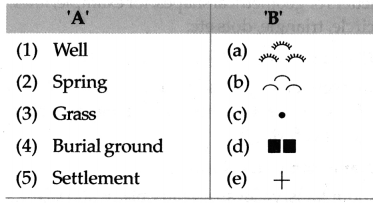
Answer:
1 – c, 2 – e, 3 – a, 4 – b, 5 – d
Answer in one sentence:
Question 1.
What are different ways of showing elevation of land on a map?
Answer:
The different ways of showing elevation of land on a map are contour line method, layer tinting method and digital elevation method.
Question 2.
What are contour lines?
Answer:
Lines on a map joining places having same height are called contour lines.
Question 3.
How are digital elevation model prepared?
Answer:
Digital elevation model is prepared with the information obtained through manmade satellites and help of computers.
Question 4.
What are physical maps used for?
Answer:
Physical maps are used in military operations, tourism, drawing up mountaineering routes, in making regional development projects etc.
![]()
Question 5.
How are conventional signs drawn?
Answer:
Conventional signs are down in the form of letters or geometrical shapes, for example, lines, circle, triangle, dots etc.
Question 6.
How are conventional symbols drawn?
Answer:
Conventional symbols are miniature drawings of the respective objects for eg, temples, mosque, forts etc.
Question 7.
Name some land forms.
Answer:
Mountains, valleys, plateaus, plains and islands are different land forms.
Question 8.
How were maps used during ancient times?
Answer:
During ancient times, maps were mainly used in wars.
Question 9.
From where is the height of land measured?
Answer:
The height of land is measured from sea-level.
Question 10.
How does contour line method help?
Answer:
Contour line method helps us to understand the slope of the land and the height of different places.
![]()
Question 11.
In layer tinting method, what do colours indicates?
Answer:
In layer tinting method, each colour indicates a specific height.
Question 12.
Why are signs and symbols used in maps?
Answer:
Standard signs and symbols are used to make the map easy to read.
Question 13.
Which is the foremost map making institute in India?
Answer:
The ‘Survey of India’ is the foremost mapmaking institute in India.
Question 14.
What are the topographic maps made by ‘Survery of India’ known for all over the world?
Answer:
The topographic maps made by ‘Survey of India’ are known all over the world for their accuracy.
![]()
Give geographical reasons:
Question 1.
Standard signs and symbols are used to make the map easy to read.
Answer:
- Many people make use of maps.
- Maps show various components.
- If these components are shown on different maps in different ways, it will be difficult to understand them.
- Therefore, standard signs and symbols are used to make the map easy to read.
Answer in brief:
Question 1.
Explain – Layer tinting method.
Answer:
- Layer tinting method is based on contour lines.
- The space between the contour lines is filled with colour.
- Each colour indicates a specific height.
- For example, water bodies – blue colour, high elevated land yellow.
Question 2.
Write a note on the ‘Survey of India’.
Answer:
- The ‘Survey of India’ is the foremost map-making institute in India.
- It was established in 1767.
- It makes a large number of topographic maps of the Indian subcontinent on various scales by conducting field surveys.
- These maps are accurate maps.
- Its headquarters are in Dehradun in Uttarakhand.
Use your brain power!
Question 1.
Join the dots that show places of the same height. What method of showing the landforms on a map have you used here?
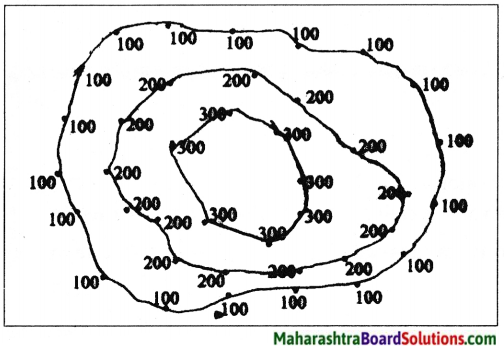
Answer:
Contour line method.
![]()
Question 2.
A map made by the layer tinting method is given in another chapter. Find the map and write its caption in the blank box below:
Answer:
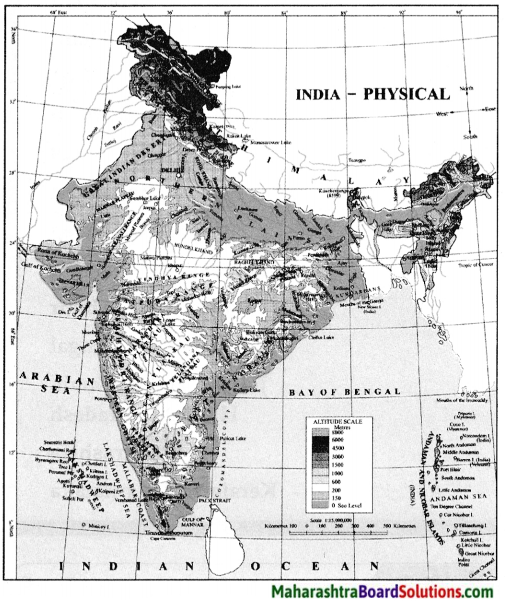
Can you tell?
Question 1.
In map A, how has the height of the land ban shown?
Answer:
Lines which are called contours.
Question 2.
Why have colours been used in map B?
Answer:
The colours between the contour lines shows the difference in the physical set up.
Question 3.
How is map C different from the other two maps?
Answer:
In map C we can directly observe the differences in the height of landforms.
Question 4.
In which direction is the highest point in map A, B, C?
Answer:
South East
![]()
Question 5.
In which map can the landforms be seen more clearly?
Answer:
Map B.
Question 6.
Can you tell?
Identify the following sign and symbols and write their names in the boxes.
Answer:
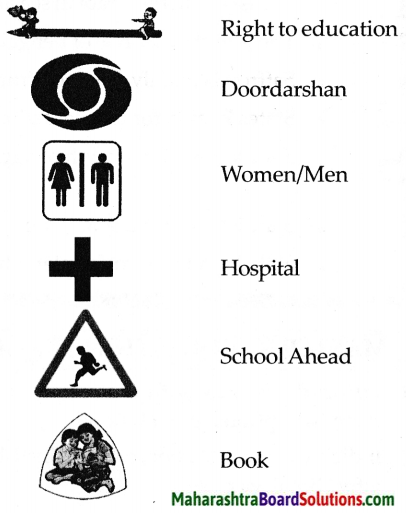
Glossary:
- elevation – fact of raising or being raised
- contour – an outline representing the shape of form
- foremost – most prominent.
- conventional – based on what is generals done or believed
Class 5 Environmental Studies Questions and Answers:
- Our Earth and Our Solar System Class 5 Questions And Answers
- Motions of the Earth Class 5 Questions And Answers
- The Earth and its Living World Class 5 Questions And Answers
- Environmental Balance Class 5 Questions And Answers
- Family Values Class 5 Questions And Answers
- Rules Are for Everyone Class 5 Questions And Answers
- Let us Solve Our own Problems Class 5 Questions And Answers
- Public Facilities and My School Class 5 Questions And Answers
- Maps – Our Companions Class 5 Questions And Answers
- Getting to Know India Class 5 Questions And Answers
- Our Home and Environment Class 5 Questions And Answers
- Food for All Class 5 Questions And Answers